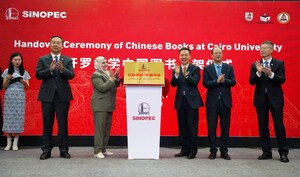WUSU, China, Nov. 14, 2025 /PRNewswire/ -- China Petroleum & Chemical Corporation (HKG: 0386, "Sinopec") reported successful results from a pilot of its PBST (polybutylene succinate-co-terephthalate) biodegradable mulch film in Wusu, Xinjiang Uygur Autonomous Region.
The PBST mulch film, developed with Sinopec's fully independent intellectual property rights, delivered largely equivalent cotton yield compared with control fields using traditional polyethylene (PE) mulch film. Its degradation performance, as well as moisture- and heat-retention capabilities, met design targets.
The project provides a feasible path to addressing residual film pollution while maintaining stable cotton yields, achieving both ecological and economic benefits and supporting the sustainable development of green agriculture.
As one of China's major cotton-producing regions, Xinjiang has long relied on PE mulch films to conserve soil moisture and increase soil temperature, which are difficult to degrade naturally, resulting in severe accumulation of residual plastic films. Other fully biodegradable films such as PBAT have a short weather-resistance cycle and often degrade too quickly before the cotton boll forming stage, leading to insufficient moisture and heat preservation that affects normal crop growth.
By contrast, PBST offers outstanding anti‑UV and moisture‑barrier performance compared with other biodegradable materials. Long‑term experiments have shown that PBST films used across different regions for different crops can fully degrade within one to three years into harmless substances.
Sinopec is accelerating the research, development, and application of PBST materials to tackle the challenge of residual mulch film in cotton fields. In March, the group commissioned the world's first 60,000‑ton‑per‑year PBST industrial production facility at its Hainan Refining & Chemical site. In April, Sinopec's production, sales, and R&D teams launched the first large‑scale PBST mulch film pilot together with local agricultural authorities in Xinjiang and Liaoning Dongsheng Group, planting over ten thousand mu of cotton fields in the key production bases of Wusu City and Kuitun City.
In October, third‑party assessments and yield measurements confirmed that PBST‑covered fields achieved yields comparable to those using traditional PE film, with significantly faster film degradation speed. The PBST film will fully decompose into water, carbon dioxide, and minerals without the need for manual retrieval. While fulfilling Xinjiang's cotton growth requirements, it also reduces costs, mitigates soil pollution from PE film residues, and demonstrates clear economic and environmental benefits—offering a replicable and scalable solution for the sustainable development of Xinjiang's agriculture.
For more information, please visit http://www.sinopec.com/listco/en/.
Logo - https://mma.prnewswire.com/media/960416/SINOPEC_Logo.jpg






Share this article